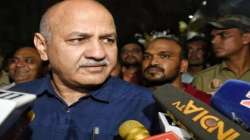Delhi excise policy scam: Supreme Court dismisses Manish Sisodia's bail pleas in money laundering cases
The Delhi government had implemented the policy on November 17, 2021, but scrapped it at the end of September 2022 amid allegations of corruption. The verdict was pronounced by a bench of Justices Sanjiv Khanna and SVN Bhatti.

Delhi excise policy scam: The Supreme Court on Monday dismissed the bail pleas of former Delhi deputy chief minister Manish Sisodia in connection with corruption and money-laundering cases involving now-scrapped excise policy for the national capital. The verdict was pronounced by a bench of Justices Sanjiv Khanna and SVN Bhatti, which had reserved its verdict on October 17 on both pleas.
"Let the trial begin...and after 3 months fresh application can be filed...One aspect regarding the transfer of money, Rs 338 crores, is tentatively established...," the bench observed.
Manoj Tiwari's reaction
Reacting to the Supreme Court's verdict, Bharatiya Janata Party (BJP) leader Manoj Tiwari said it is evident that the entire Aam Aadmi Party gang is involved in corruption and their money trail has been established. I am certain that the top leaders of AAP will be arrested soon. Arvind Kejriwal will also be arrested," he added.
Earlier on October 17, the apex court informed the Enforcement Directorate (ED) that it would be challenging to establish Sisodia's money-laundering case if a bribe purportedly received for altering the Delhi excise policy is not included in the predicate offence. It had informed the federal agency that it could not operate under the presumption that bribes were paid and that it was necessary to provide any legal protections.
Sisodia's arrest
On February 26, Sisodia was arrested by the Central Bureau of Investigation (CBI) for his alleged role in the "scam". The Aam Aadmi Party (AAP) leader has been in custody since then. The ED arrested Sisodia in a money-laundering case stemming from the CBI FIR on March 9 after questioning him in the Tihar jail.
Why Sisodia was denied bai by high court?
The high court denied him bail in the CBI case on May 30, saying having been the deputy chief minister and excise minister, he is a "high-profile" person who has the potential to influence the witnesses. On July 3, the high court declined him bail in the money-laundering case linked to alleged irregularities in the city government's excise policy, holding that the charges against him are "very serious in nature".
The Delhi government had implemented the policy on November 17, 2021, but scrapped it at the end of September 2022 amid allegations of corruption. According to the investigating agencies, the profit margins of wholesalers were increased from 5 to 12 per cent under the new policy.
The agencies have alleged that the new policy resulted in cartelisation and those ineligible for liquor licences were favoured for monetary benefits. However, the Delhi government and Sisodia have denied any wrongdoing and said the new policy would have led to an increase in the State's revenue share.
Delhi Excise Policy
The ED's money laundering case stems from the CBI FIR. According to the CBI and the ED, irregularities were committed while modifying the Delhi Excise Policy 2021-22 and undue favours were extended to licence holders.
The Delhi government had implemented the excise policy on November 17, 2021, but scrapped it at the end of September 2022 amid allegations of corruption.
(With PTI inputs)
ALSO READ: Supreme Court reserves order on Manish Sisodia's bail plea in Delhi liquor scam